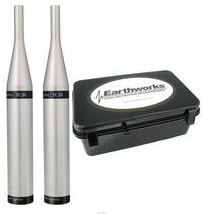The Trouble With Recording With Omnidirectional Mics In A Small Room
[I’m re-posting this article from earlier, since it has a lot of relevance to the recent series we’ve been running – Improve The Quality Of The Audio You Record At Home – on controlling room sound.]
A reader asked me this week if I could shed any light on why his recordings weren’t sounding very good. He was using two very good microphones to record an organ, which he described as a large classic “church” type organ.
He was using a pair of omnidirectional microphones and had tried various positions around the room, including the “spaced pair” configuration common when using “omnis.”
We had a few back-and-forth exchanges, concluding that even though the mics he was using, a pair of Earthworks SROs, (now redesignated the Earthworks TC20) are very fine microphones, they will pick up a lot of room noise, being omnidirectional.
So if the room is small and has the same issues as most home recording studios, namely that there are lots of room echoes and generally bad acoustics, the resulting recording won’t sound very good. By the way, the acronym “SRO” stood for “Sound Reinforcement Omni.”
The Recommended Solution
Below is the full exchange.
Hi Ken,
I am trying to record organ music but the resulting sound is quite dry and seems “flat”. The organ is a large classic “church” type organ. I am using Earthworks SRO match mics (bought them because they were supposed to give an essentially flat response), and have done a lot of experimenting with placement in the room with negligible improvement. Also using Apogee Duet (the Firewire model) and their Maestro software on a MacBook Pro. Any suggestions would be appreciated. I am quite willing to change any of the equipment if that is important. Have enjoyed learning from your website.
Warmly,
John
Hi John,
So you’re using a pair of Earthworks omnis? You said you’d done experimenting with placement, so I assume you’ve tried the standard stereo positions. I think the recommended thing with omnidirectional mics is to have them in a spaced-pair configuration (https://goo.gl/YCFzwj). If you’ve tried that and it still does not sound good, it is likely to be the room the organ is in. Omni mics will sound terrible in a room with a lot of “room sound,” like a small room in your house (though it doesn’t sound like a church organ would fit in your home – not sure how big it is). If that is the case (bad room), I would try using a pair of large diaphragm condenser mics (LDC) in cardioid mode (most default to this) instead, just as a test to see if it gives you any better of a result. You might also try just a pair of dynamics like the Shure SM-57 or Shure SM-58.
Another question would be something that sounds simple, but a lot of people get wrong. In your recording software, are you recording each mic to its own track? In other words, there should be two tracks of audio when you’re done recording, one for each mic. Even that isn’t enough, though. You then have to pan the tracks “hard left and right,” meaning that track 1 needs to go 100% to the left and track 2 needs to be panned 100% to the right (or vice versa). It’s one of those things that isn’t always so obvious.
I hope that helps!
Ken
Hi Ken,
Thank you for the quick reply. I did try the spaced-pair configuration along with others with not much difference. I think you are right about the room size. It is a large church organ but it is in my home – a room about 18’ x 22’ so there is a lot of organ for the small room. I could always sell the Earthworks pair if the large diaphragm works better. I notice you like the AT2035 in one of your reviews. Is there another that you would prefer for such big sound in a small room. Do you feel I need two mikes in this situation or would one do it since there is not a lot of stereo effect in the smaller space.
Also (don’t want to bug you too much or take too much of your time), I would have not trouble moving to the Reaper 4 software if you think it would be helpful. Not quite sure why, however, in your video demo of Reaper you switch to Audacity to do the editing. Can you not do the same in Reaper 4?
Thanks a lot,
John
Hi John,
I have been asked the question about why I go to a separate editor in that video a lot. I actually put commentary on the You Tube video that says it isn’t strictly necessary – just something I have done for years. But in my Reaper course, I show you how to do everything right in Reaper.
As for the organ, I thought it might be the case that a poor room sound was causing the problem. Home recording studios almost all have that problem, ans it’s made much worse by the use of omni-directional mics. So using cardioid mics will help quite a lot, and the closer you get them to the organ, the better (less room noise). This is because the cardioid pattern picks up audio best from in front of it and rejects sound from behind it, something omnis don’t do (hence the name).
As for the types of LDCs – yeah, the AT2035 would be great, though there are a lot of choices (I use a Rode NT2-A as my main vocal mic, but it’s more expensive). The AT2020 might work well too for much less money than the AT2035. What mic will work best for you all boils down to your space and your instrument (including voice). Plus budget is a factor for most. If I had the budget, I’d have a matched pair of Neumann U87s :).
About the stereo thing, you may be right. It depends on how the sound comes out of the organ in that room. If, by the time it reaches the mics, it’s just a wall of very loud sound, then stereo imaging will be difficult. But again, only trying it will show you.
One trick you can try is to record with just one mic onto one track. Then copy the audio on that track and paste it into a 2nd track. Then offset the 2nd audio item by 30 milliseconds or so (experiment) and pan both tracks hard left and right. You create “fake stereo” this way. It can be very effective. Also, this is demonstrated in the Reaper course:).
I am not familiar with the software you mentioned – Maestro, but I always recommend Reaper since it so fabulous.
Hope that helps.
Ken


